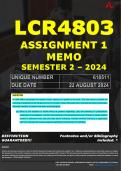A +
QUESTION
In 1644 Milton developed his speech theory based on a quest for the truth. This was done to protest the
licensing of publications by the government of his day. Today, 360 years later, licensing remains problematic,
although freedom of speech has been acknowledged.
(a) What is the situation in South Africa at present regarding: (aa) the licensing of publications,
especially of newspapers, and (bb) the licensing of broadcasting services? Explain in detail whether
control is exercised over (aa) and (bb) above licensing. Indicate whether licensing is applicable,
and if so, discuss the various aspects pertaining to licensing, for example,
DISTINCTION Footnotes and/or Bibliography
GUARANTEED!!! included. *
Disclaimer
Extreme care has been used by our Tutors to draft this document, however the contents are provided “as is” without any representations or warranties, express or implied.
This document is to be used for comparison, research, and reference purposes ONLY. No part of this document may be reproduced, resold, or transmitted in any form or by
any means without prior written permission from the Author. By making use of this document, you agree to fully accept the consequences should you plagiarise or misuse
this document. – STUDY BUDDY TUTOR SA
PAST PAPERS & MEMOS, ASSIGNMENT MEMOS, NOTES, SUMMARIES & TUITIONS.
Cell: 062 810 8624 Email: studybuddytutorsa@gmail.com
, LCR4803
ASSIGNMENT 1
Media Law
1.1 In 1644 Milton developed his speech theory based on a quest for the truth. This
was done to protest the licensing of publications by the government of his day. Today,
360 years later, licensing remains problematic, although freedom of speech has been
acknowledged.
(a) What is the situation in South Africa at present regarding: (aa) the licensing of
publications, especially of newspapers, and (bb) the licensing of broadcasting
services? Explain in detail whether control is exercised over (aa) and (bb)
above licensing. Indicate whether licensing is applicable, and if so, discuss the
various aspects pertaining to licensing, for example,
(i) the categories of licenses.
(ii) the person or institution issuing the licenses.
(iii) the person or institution to whom complaints regarding the services in the case of
(aa) and (bb) should be directed.
(b) Are there valid reasons why the above approach regarding licensing should be
followed by the South African government? (10) [20]




